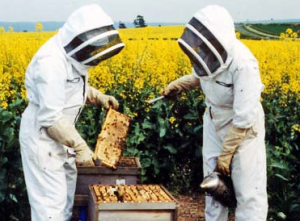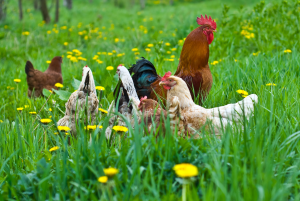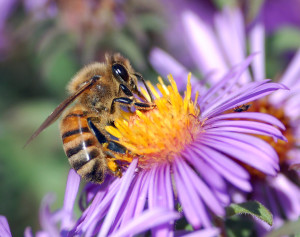Victory for Mexico Beekeepers as Monsanto Loses GM Permit
A small group of beekeepers in Mexico has inflicted a blow on biotech giant Monsanto, by halting the company’s plan to grow thousands of acres of GMO soybeans. A district judge in the state of Yucat?n last month overturned a permit issued to Monsanto by Mexico’s agriculture ministry, Sagarpa, and environmental protection agency, Semarnat, in June 2012, that allowed commercial planting of Roundup-ready soybeans. The permit authorized Monsanto to plant its seeds in seven states, over more than 625,000 acres, despite protests from thousands of Mayan farmers and beekeepers,  and organizations. The judge withdrew the permit due to the scientific evidence presented about the threats posed by GM soy crops to honey production in the Yucat?n peninsula, ruling that co-existence between honey production and GM soybeans is not possible. Mexico is the world’s six biggest producer and third largest exporter of honey. About 25,000 families on the Yucat?n peninsula depend on honey production. This is a victory for not only the beekeepers of Mexico, but the surrounding farmers, and of course for the bees as well.
and organizations. The judge withdrew the permit due to the scientific evidence presented about the threats posed by GM soy crops to honey production in the Yucat?n peninsula, ruling that co-existence between honey production and GM soybeans is not possible. Mexico is the world’s six biggest producer and third largest exporter of honey. About 25,000 families on the Yucat?n peninsula depend on honey production. This is a victory for not only the beekeepers of Mexico, but the surrounding farmers, and of course for the bees as well.
USDA Releases Final Rule to Privatize Poultry Inspection
The U.S. Department of Agriculture (USDA) recently released the final rule on a new inspection system for poultry products. The system will transfer a majority of poultry inspections from government inspectors to self-policing by the companies themselves. As mentioned by Food & Water Watch Executive Director, Wenonah Hauter, the result of this new rule is that ?the one USDA inspector left on the slaughter line.?The U.S. Department of Agriculture (USDA) recently released the final rule on a new inspection system for poultry  products. The system will transfer a majority of poultry inspections from government inspectors to self-policing by the companies themselves. As mentioned by Food & Water Watch Executive Director, Wenonah Hauter, has stated that ?the one USDA inspector left on the slaughter line?.will still have to inspect 2.33 birds every second?an impossible task that leaves consumers at risk.? The new regulations were first proposed in January 2012, but delayed after receiving strong opposition from several organizations, along with more than 175,000 public comments, mostly opposed to the proposal. There have also been petitions and several congressional letters sent to USDA and the White House urging the withdrawal of the rule. This deregulation of poultry processing will result in a less safe processing of chicken, and put millions of consumers at risk. Please keep this new rule in mind when purchasing chicken in the future.
products. The system will transfer a majority of poultry inspections from government inspectors to self-policing by the companies themselves. As mentioned by Food & Water Watch Executive Director, Wenonah Hauter, has stated that ?the one USDA inspector left on the slaughter line?.will still have to inspect 2.33 birds every second?an impossible task that leaves consumers at risk.? The new regulations were first proposed in January 2012, but delayed after receiving strong opposition from several organizations, along with more than 175,000 public comments, mostly opposed to the proposal. There have also been petitions and several congressional letters sent to USDA and the White House urging the withdrawal of the rule. This deregulation of poultry processing will result in a less safe processing of chicken, and put millions of consumers at risk. Please keep this new rule in mind when purchasing chicken in the future.
Vermont Law School Becomes First BEE Protective Campus
Vermont Law School has gone neonicotinoid pesticide-free, making it the first higher-education campus in the country to earn official recognition from the?BEE Protective Campaign, led by Beyond Pesticides and Center for Food Safety. The university joins a growing group of communities across the country that are taking action in protect pollinators in the absence of federal regulation,?including Eugene, OR,? Spokane, WA, and Shorewood, Minnesota.  Neonicotinoids are a class of insecticides that affect the central nervous system of insects, resulting in paralysis and death. These pesticides include imidacloprid, acetamiprid, clothianidin, dinotefuran, nithiazine, thiacloprid and thiamethoxam. Usage of neonicotinoids on agricultural, ornamental?and garden plants have been a major factor in recent global bee die-offs, also known as Colony Collapse Disorder. Beyond Pesticides, along with other several other groups, filed a lawsuit against the EPA on its continued use of these chemicals. The groups are also working to put pressure on lawmakers in Congress to take action to protect pollinators with the Saving America?s Pollinator Act, H.R. 2692, introduced by Representatives John Conyers (D-MI) and Earl Blumenauer (D-OR), which is gaining support in the House. For more information on how to truly bee protective, join the campaign and take action at www.BeeProtective.org.
Neonicotinoids are a class of insecticides that affect the central nervous system of insects, resulting in paralysis and death. These pesticides include imidacloprid, acetamiprid, clothianidin, dinotefuran, nithiazine, thiacloprid and thiamethoxam. Usage of neonicotinoids on agricultural, ornamental?and garden plants have been a major factor in recent global bee die-offs, also known as Colony Collapse Disorder. Beyond Pesticides, along with other several other groups, filed a lawsuit against the EPA on its continued use of these chemicals. The groups are also working to put pressure on lawmakers in Congress to take action to protect pollinators with the Saving America?s Pollinator Act, H.R. 2692, introduced by Representatives John Conyers (D-MI) and Earl Blumenauer (D-OR), which is gaining support in the House. For more information on how to truly bee protective, join the campaign and take action at www.BeeProtective.org.

Comments are closed.